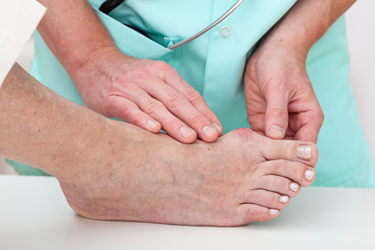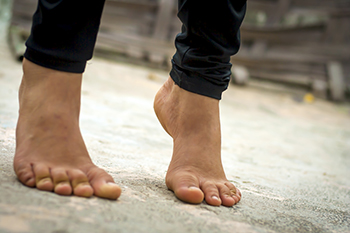Connect With Us
Blog
 A bunion is a bony bump located on the outside of the big toe. The bump may be swollen, red, and irritated due to friction as it rubs against your shoes. Bunions deform the feet, making the first metatarsal foot bone stick out and causing the big toe to point towards the other toes. Thick, hardened skin or calluses often form on the second toe and underneath the big toe. A bunion can also make it difficult to find comfortable shoes, as they change the structure of the feet. They can also cause pain and discomfort while walking or standing. Bunions tend to get worse without treatment, so if you have bunions, it is suggested that you seek the care of a podiatrist to stop or slow their progression and get the right treatment for you.
A bunion is a bony bump located on the outside of the big toe. The bump may be swollen, red, and irritated due to friction as it rubs against your shoes. Bunions deform the feet, making the first metatarsal foot bone stick out and causing the big toe to point towards the other toes. Thick, hardened skin or calluses often form on the second toe and underneath the big toe. A bunion can also make it difficult to find comfortable shoes, as they change the structure of the feet. They can also cause pain and discomfort while walking or standing. Bunions tend to get worse without treatment, so if you have bunions, it is suggested that you seek the care of a podiatrist to stop or slow their progression and get the right treatment for you.
If you are suffering from bunion pain, contact one of our podiatrists of Sutera and Jones Surgical Podiatry. Our doctors can provide the care you need to keep you pain-free and on your feet.
What Is a Bunion?
Bunions are painful bony bumps that usually develop on the inside of the foot at the joint of the big toe. As the deformity increases over time, it may become painful to walk and wear shoes. Women are more likely to exacerbate existing bunions since they often wear tight, narrow shoes that shift their toes together. Bunion pain can be relieved by wearing wider shoes with enough room for the toes.
Causes
- Genetics – some people inherit feet that are more prone to bunion development
- Inflammatory Conditions - rheumatoid arthritis and polio may cause bunion development
Symptoms
- Redness and inflammation
- Pain and tenderness
- Callus or corns on the bump
- Restricted motion in the big toe
In order to diagnose your bunion, your podiatrist may ask about your medical history, symptoms, and general health. Your doctor might also order an x-ray to take a closer look at your feet. Nonsurgical treatment options include orthotics, padding, icing, changes in footwear, and medication. If nonsurgical treatments don’t alleviate your bunion pain, surgery may be necessary.
If you have any questions, please feel free to contact one of our offices located in Media, Glen Mills, Riddle Memorial Hospital, and Concordville, PA . We offer the newest diagnostic and treatment technologies for all your foot care needs.
Plantar hyperhidrosis is a condition that causes the feet to sweat excessively. Having wet, sweaty feet most of the time is not only annoying, but can ruin your shoes, increase your risk of slipping and falling, and break down the skin on the feet, leading to athlete’s foot and other skin infections. The first line of treatment for this condition is usually topical medications, which are applied directly to the skin’s surface. Your podiatrist may prescribe an antiperspirant cream or powder. If these fail, your doctor may suggest iontophoresis, a procedure that uses electrical currents to reduce sweating. Botox injections into the feet are another potential solution. To learn more about treatments for plantar hyperhidrosis, please consult with a podiatrist.
If you are suffering from hyperhidrosis contact one of our podiatrists of Sutera and Jones Surgical Podiatry. Our doctors can provide the care you need to attend to all of your foot and ankle needs.
Hyperhidrosis of the Feet
Hyperhidrosis is a rare disorder that can cause people to have excessive sweating of their feet. This can usually occur all on its own without rigorous activity involved. People who suffer from hyperhidrosis may also experience sweaty palms.
Although it is said that sweating is a healthy process meant to cool down the body temperature and to maintain a proper internal temperature, hyperhidrosis may prove to be a huge hindrance on a person’s everyday life.
Plantar hyperhidrosis is considered to be the main form of hyperhidrosis. Secondary hyperhidrosis can refer to sweating that occurs in areas other than the feet or hands and armpits. Often this may be a sign of it being related to another medical condition such as menopause, hyperthyroidism and even Parkinson’s disease.
In order to alleviate this condition, it is important to see your doctor so that they may prescribe the necessary medications so that you can begin to live a normal life again. If this is left untreated, it is said that it will persist throughout an individual’s life.
A last resort approach would be surgery, but it is best to speak with your doctor to find out what may be the best treatment for you.
If you have any questions please feel free to contact one of our offices located in Media and Glen Mills, PA . We offer the newest diagnostic and treatment technologies for all your foot and ankle needs.
Read more about Hyperhidrosis of the FeetPlantar hyperhidrosis is a condition that causes the feet to sweat excessively. Having wet, sweaty feet most of the time is not only annoying, but can ruin your shoes, increase your risk of slipping and falling, and break down the skin on the feet, leading to athlete’s foot and other skin infections. The first line of treatment for this condition is usually topical medications, which are applied directly to the skin’s surface. Your podiatrist may prescribe an antiperspirant cream or powder. If these fail, your doctor may suggest iontophoresis, a procedure that uses electrical currents to reduce sweating. Botox injections into the feet are another potential solution. To learn more about treatments for plantar hyperhidrosis, please consult with a podiatrist.
If you are suffering from hyperhidrosis contact one of our podiatrists of Sutera and Jones Surgical Podiatry. Our doctors can provide the care you need to attend to all of your foot and ankle needs.
Hyperhidrosis of the Feet
Hyperhidrosis is a rare disorder that can cause people to have excessive sweating of their feet. This can usually occur all on its own without rigorous activity involved. People who suffer from hyperhidrosis may also experience sweaty palms.
Although it is said that sweating is a healthy process meant to cool down the body temperature and to maintain a proper internal temperature, hyperhidrosis may prove to be a huge hindrance on a person’s everyday life.
Plantar hyperhidrosis is considered to be the main form of hyperhidrosis. Secondary hyperhidrosis can refer to sweating that occurs in areas other than the feet or hands and armpits. Often this may be a sign of it being related to another medical condition such as menopause, hyperthyroidism and even Parkinson’s disease.
In order to alleviate this condition, it is important to see your doctor so that they may prescribe the necessary medications so that you can begin to live a normal life again. If this is left untreated, it is said that it will persist throughout an individual’s life.
A last resort approach would be surgery, but it is best to speak with your doctor to find out what may be the best treatment for you.
If you have any questions please feel free to contact one of our offices located in Media, Glen Mills, Riddle Memorial Hospital, and Concordville, PA . We offer the newest diagnostic and treatment technologies for all your foot and ankle needs.
Blog Archives
- April 2024
- March 2024
- February 2024
- January 2024
- December 2023
- November 2023
- October 2023
- September 2023
- August 2023
- July 2023
- June 2023
- May 2023
- April 2023
- March 2023
- February 2023
- January 2023
- December 2022
- November 2022
- October 2022
- September 2022
- August 2022
- July 2022
- June 2022
- May 2022
- April 2022
- March 2022
- February 2022
- January 2022
- December 2021
- November 2021
- October 2021
- September 2021
- August 2021
- July 2021
- June 2021
- May 2021
- April 2021
- March 2021
- February 2021
- January 2021
- December 2020
- November 2020
- October 2020
- September 2020
- August 2020
- July 2020
- June 2020
- May 2020
- April 2020
- March 2020
- February 2020
- January 2020
- December 2019
- November 2019
- October 2019
- September 2019
- August 2019
- July 2019
- June 2019
- May 2019
- April 2019
- March 2019
- February 2019
- January 2019
- December 2018
- November 2018
- October 2018
- September 2018
- August 2018
- July 2018
- June 2018
- May 2018
- April 2018
- March 2018
- February 2018
- January 2018
- December 2017
- November 2017
- October 2017
- September 2017
- August 2017
- July 2017
- June 2017
- May 2017
- April 2017
- March 2017
- February 2017
- January 2017
- December 2016
- November 2016
- October 2016
- September 2016
- August 2016
- July 2016
- June 2016
- May 2016
- April 2016
- March 2016
- February 2016
- January 2016
- December 2015
- November 2015
- October 2015
- September 2015
- August 2015
- July 2015
- June 2015
- May 2015
- April 2015
- March 2015
- February 2015
- January 2015
- December 2014
- November 2014
- October 2014
- September 2014





